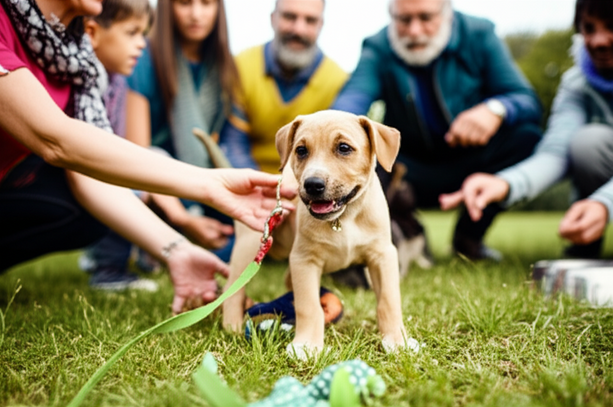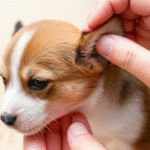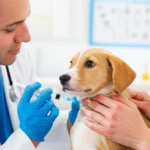The Importance of Early Socialization
The period between 3 and 14 weeks of age is a crucial socialization window for puppies. During this time, puppies are most receptive to new experiences and develop foundational social skills (ASPCA). Exposing a puppy to various sights, sounds, smells, people, and other animals during this critical period helps them become well-adjusted adults. Early socialization reduces the likelihood of behavioral problems like fear, aggression, and anxiety later in life (VCA Animal Hospitals). Missing this critical window can hinder a puppy’s development and increase the risk of behavioral issues, underscoring the significance of early socialization. Positive interactions and controlled exposure during this phase shape a puppy’s personality and contribute significantly to their overall well-being (The Humane Society of the United States). For a comprehensive guide on socializing your puppy, visit our detailed article: How to Socialize Your Puppy: A Complete Guide.
Safe and Effective Socialization Strategies
Early socialization is crucial for developing a well-adjusted adult dog. Introduce your puppy to new people gradually, starting with calm and friendly individuals. Reward positive interactions with treats and praise (ASPCA). Slowly introduce your puppy to other dogs in controlled environments, ensuring both dogs are comfortable (The Humane Society of the United States). Short, positive experiences are key. Expose your puppy to various sights, sounds, and surfaces, like grass, pavement, and busy streets, to build confidence (VCA Animal Hospitals). Continue socialization throughout your puppy’s first year to help them become a happy, well-adjusted member of society. For more detailed information on socializing your puppy, visit our complete guide.
Recognizing and Addressing Socialization Challenges
Recognizing fear in your puppy is crucial. Fear can manifest as tucked tails, flattened ears, whale eyes (showing the whites of their eyes), lip licking, yawning, shaking, and attempts to hide or escape. Anxiety may present as similar behaviors, coupled with panting, pacing, and whining (VCA Animal Hospitals). Aggression can involve growling, snapping, snarling, lunging, and biting (ASPCA). If your puppy displays fear, create a safe space away from the stimulus. Gradually reintroduce them to the trigger at a comfortable distance, rewarding calm behavior with treats and praise. For anxiety, use calming techniques like gentle petting and soft music. If your puppy shows aggression, consult with a professional dog trainer or veterinary behaviorist for guidance (How to Socialize Your Puppy: A Complete Guide). Early intervention is crucial for addressing these socialization challenges.
Socialization Beyond Puppyhood
Socialization shouldn’t stop after puppyhood. Continuing to expose your dog to new sights, sounds, smells, people, and other animals throughout adolescence and adulthood is crucial for maintaining a well-adjusted and happy companion. Adolescent dogs (typically between 6 months and 2 years old) can experience fear periods, making ongoing socialization even more critical (ASPCA). Regular socialization helps prevent fear-based aggression and reactivity, fostering a confident and adaptable dog (VCA Animal Hospitals). Even adult dogs benefit from new experiences, which enrich their lives and prevent them from becoming overly fearful or anxious in unfamiliar situations. Consider enrolling in ongoing training classes, visiting new dog-friendly locations, or arranging playdates with friendly and vaccinated dogs to maintain socialization efforts throughout your dog’s life. This continued exposure ensures your dog remains comfortable and confident in various environments and interactions. For more puppy socialization tips visit: How to Socialize Your Puppy.
Creating a Socialization Checklist
Creating a Socialization Checklist for your puppy is crucial for their development into a well-adjusted adult dog. Use this checklist to track your puppy’s progress:
People:
- Encountering people of different ages (NCBI): Children, teenagers, adults, seniors.
- Interacting with people of diverse appearances (ScienceDirect): Varying heights, clothing (hats, sunglasses), and physical attributes.
- Experiencing different human handling (NIH): Being petted, held, having paws touched, ears examined.
Environment:
- Exposure to various surfaces (NIH): Grass, concrete, gravel, wood chips.
- Navigating different locations (AVSAB): Parks, busy streets, pet stores, veterinary clinics. For more tips on how to socialize your puppy, read this article.
- Encountering novel objects (ScienceDirect): Umbrellas, balloons, plastic bags, traffic cones.
Other Animals:
- Controlled interactions with other puppies (AVSAB): Supervised playdates.
- Exposure to other vaccinated, friendly adult dogs (Applied Animal Behaviour Science): Calm, controlled interactions.
Situations:
- Experiencing different noises (AVSAB): Traffic, sirens, doorbells, thunder.
- Riding in the car (AVMA): Short trips, gradually increasing duration.
- Being left alone (MSPCA): Practicing short periods of alone time, gradually increasing duration.
Remember, early socialization is critical for developing a well-adjusted and confident companion. Consult with a veterinarian or a professional dog trainer for personalized guidance. This checklist provides a starting point for you to adapt and personalize based on your puppy’s breed, age, and individual experiences.
Sources
- Applied Animal Behaviour Science – A meta-analysis of the effects of early socialization on dog behaviour
- ASPCA – Aggression
- ASPCA – Fear in Dogs
- ASPCA – Socializing Your Dog
- AVSAB – Position Statements
- AVMA – Vehicle Travel Safety
- DogsCare.Life – How to Socialize Your Puppy: A Complete Guide
- The Humane Society of the United States – Puppy Socialization
- MSPCA – How to Deal with Separation Anxiety in Dogs
- NIH – Effects of environmental enrichment for dogs
- NIH – Human interaction and dog welfare
- NCBI – Integrating dogs into families
- ScienceDirect – A meta-analysis of the effects of early socialization on dog behaviour
- VCA Animal Hospitals – Fear, Anxiety, and Aggression in Dogs
- VCA Animal Hospitals – Dog Behavior and Training – Socialization


